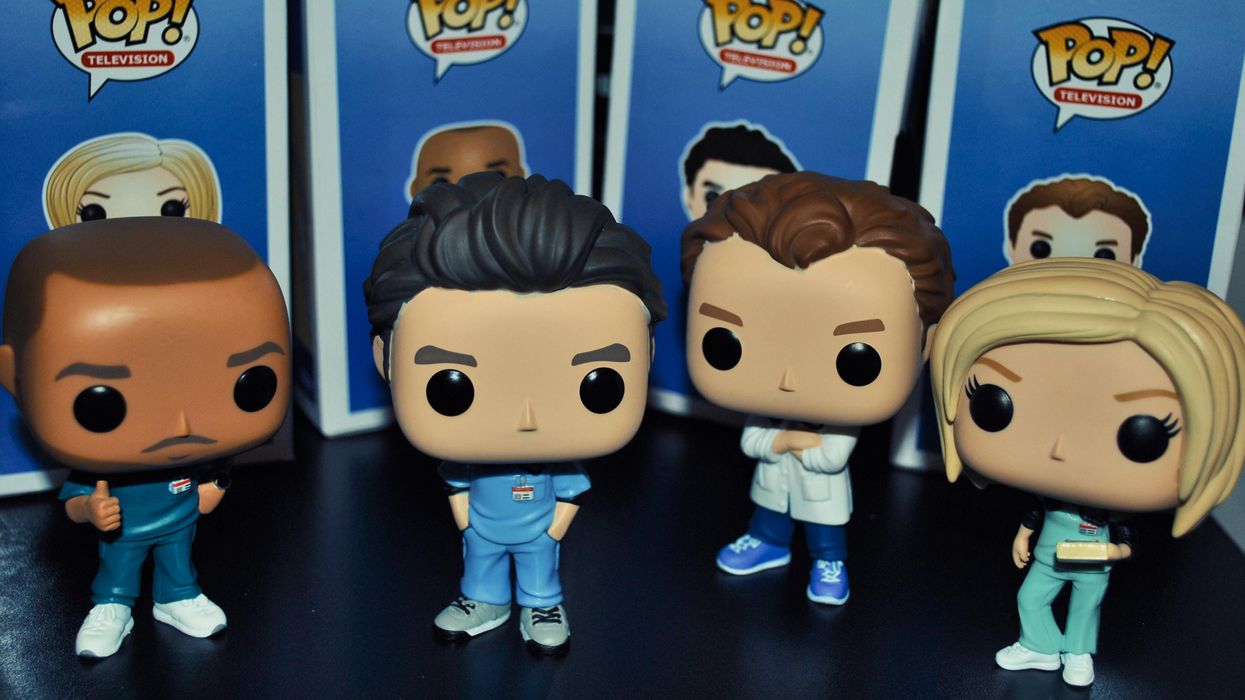This week, eBay acquired a stake in Funko to become the preferred marketplace for its pop culture collectibles, Kering and Leonardo DiCaprio invested in lab-grown leather and a pet supplement company joined a telehealth startup.
FUNDING
eBay, investors acquire stake in Funko
eBay will become the secondary marketplace for pop culture products from Funko after joining with a group of investors to acquire a 25% stake in the brand.
In a deal announced May 5, eBay joined a consortium led by investment firm The Chernin Group to infuse $263 million into Funko. The consortium also includes former Disney CEO Robert A. Iger and prominent sports agent Rich Paul.
Everett, Washington-based Funko makes figurines, bobbleheads, board games and other collectibles for pop culture titles like Disney, Marvel and Harry Potter, as well as sports leagues such as the NBA and NFL.
Along with the eBay partnership, Iger and The Chernin Group cofounder Peter Chernin will serve as advisors to Funko’s board of directors, and Paul will provide insights from his experience in sports and music to advance product development.
"We believe Funko is significantly undervalued in the public markets and at this highly attractive entry price provides a runway of opportunity and growth potential,” Chernin said in a statement. “There are many areas of identifiable growth across content, commerce, marketplaces, consumer products and technology that should drive substantial increases to Funko's performance.
The consortium aims to expand Funko’s IP and Pop! Aesthetic into new content areas, expand Funko’s pop culture platform by adding physical and digital categories and brands, growing the brand’s direct-to-consumer business and growing its reach into international markets.
"Funko sits at the intersection of pop culture, passion and collectibles, with one of the most engaged communities of enthusiasts," said Stefanie Jay, eBay chief business and strategy officer, in a statement. "Building on the incredible appetite for Funko products on eBay, we look forward to what our companies can do together. The investment and partnership with Funko will make eBay the preferred resale marketplace for Funko fans around the world and give customers new and exclusive products."
Self-checkout startup Mashgin raises $62.5 million
Mashgin, a company that makes a self-checkout solution, raised $62.5 million in Series B funding at a $1.5 billion valuation.
The round was led by prominent investment firm NEA, and included investment from Matrix Partners.
The company's touchless checkout system uses AI and computer vision to identify items and ring them up to complete a transaction. It has kiosks at 800 locations, including convenience store chains ampm and Delek, airports, 30 sports stadiums and businesses in cafes and hospitals.
"The global pandemic accelerated the adoption of touchless technologies, but consumer behavior has turned them into the baseline expectation," said Mashgin Chief Technology Officer and Cofounder Mukul Dhankar, in a statement. "Our mission is to leverage artificial intelligence to create real world benefits for people. By making time-draining tasks fast and seamless, we enable consumers to get back to what really matters, while freeing up businesses to truly innovate on the customer experience to build lasting loyalty."
Flyp raises $10 million
Flyp, which makes tools for online resale and consignment, raised $10 million, according to Techcrunch.
The round was led by Asymmetric Capital Partners. It included participation from existing investors NextView, Afore, Interlace Ventures, Alante Capital, BAM Ventures, 1517 and GroundUp. New investors Gaingels and Tectonic Ventures also joined, along with. Mercari CEO Ryo Ishizuka.
Flyp is focusing on “power resellers,” aiming to empower people who tend to engage in secondhand online selling part-time with the enterprise-level software that can help to build a full-time business. The company's products include an automation tool manages listings across multiple channels, and a matching platform pairs those who have goods to part with, and those who wish to resell them.
Clerk rings up $30 million Series B
Clerk, a retail tech company focused on improving the brick-and-mortar grocery shopping experience, raised $30 million in a Series B round led by Sageview Capital.
Founded in 2018, Austin, Texas-based Clerk created an in-store retail media product called Grocery TV. The company has provided 14,000 advertising displays that appear in checkout aisles across 50 states, at retailers such as ShopRite, Bashas' and Cub Foods. It also has partnerships with programmatic networks such as The Trade Desk and Yahoo DSP.
Another offering from the company is a SaaS merchandising product that uses machine learning to help grocers ensure that products are in-stock and shelved correctly.
"Brick-and-mortar stores are overdue for a digital transformation," Clerk CEO Marlow Nickell said in a statement. "Although 90% of U.S. grocery sales still happen in stores, brands and retailers often don't have a simple way to manage store performance and product interactions like they do online — our team wants to change that. This investment will get us closer to providing our retail and advertising partners full transparency into their store experience, from understanding how their products are performing to measuring customer engagement with in-store touchpoints."
Kering, Leonardo DiCpario invest in lab-grown leather
A group of prominent investors including the French luxury group Kering and actor Leornardo DiCaprio are backing a biotech startup developing lab-grown leather.
VitroLabs received $46 million in a Series A financing to build and scale pilot production, according to a news release.
The round was led by Agronomics, with the full list of other investors participating including BESTSELLER's Invest FWD, Kering, Khosla Ventures, DiCaprio, New Agrarian and Regeneration.VC. Kering has an existing partnership with the Bay Area-based company to provide support for product quality testing, tanning and finishing.
The seven-year-old company is developing advanced tissue engineering processes to create leather from animal cell cultures. It aims to bring change to the apparel industry aimed at reducing environmental impact and improving animal welfare. In the fall of 2021, the company made a move toward commercialization by opening a 45,000 square foot facility with pilot production and lab space.
“We believe that innovation is key to addressing the sustainability challenges that the luxury industry is facing, which is why we are very interested in the potential of biomaterials such as cultivated leather," said Marie-Claire Daveu, Chief Sustainability and Institutional Affairs Officer at Kering, in a statement.
Artemest raises $15 million euros
Italian luxury marketplace Artemest raised 15 million euros as it eyes expansion in global markets, including the United States.
The investment round was led by IRIS Ventures and Olma Luxury Holdings.
Founded by Ippolita Rostagno and Marco Credendino, the Milan-based company set out to provide an online marketplace for creators and artisans in Italy. It is now providing space to sell for more than 1,300+ Italian artisans, who offer more than 60,000 products, including home décor, art and furniture.
With the funding, it plans to accelerate global expansion, improve technology and further its brand, among other initiatives.
M&A
Pet health startup Fuzzy acquires Dandy
Digital pet health company Fuzzy is acquiring a pet supplement startup as it grows across telehealth and ecommerce.
The San Francisco-based company acquired Dandy, a pet supplement company that uses personalized data and delivers packs directly to customers' front doors. With the acquisition, Dandy founder Danielle Sobel will lead community-building and influencer marketing across Fuzzy.
“Dandy and Fuzzy were built with the same mission – to improve the lives of our pets through thoughtful, personalized care,” Sobel said in a statement. “I believe this partnership will fundamentally change the way pet parents tackle pet health, from daily wellness to emergency care, and everything in between.”
Fuzzy’s telehealth arm includes a subscription-based service that offers connections with vets via chat, virtual consultations and on-demand answers from experts. Through ecommerce, it offers products and personalized programs for nutrition, training, and obedience. Later this year, Fuzzy is planning to introduce a retail partnership with an as-yet-unnamed company that includes a subscription offering and monthly store credit on pet products.
The Publicis Groupe acquires Profitero
Multinational communications firm The Publicis Groupe has acquired ecommerce analytics platform Profitero.
Profitero developed a SaaS platform that includes diagnostic tools and digital shelf analytics. According to the company, the technology is used by more than 4,000 brands and 70 million products on more than 700 retailer websites, in over 50 countries. Profitero has 300 employees, and will continue as a company within The Publicis Groupe led by CEO Bryan Wiener and President Sarah Hofstetter.
“This is the best of both worlds as we retain our entrepreneurial spirit as a product-led organization while benefiting from the Publicis Groupe's diverse capabilities and scale,” Wiener said in a statement. "This brings immediate value to our clients and employees with increased product and technology investment, infusion of new media and content activation capabilities and tapping into the Groupe’s global talent to fuel our continued growth.”
Terms of the deal were not disclosed.
Swiftline Corp. acquires Charm.io
Ecommerce software company Swiftline Corp. acquired direct-to-consumer-focused ecommerce platform Charm.io.
Charm.io indexes, profiles, and ranks DTC brands. Its clients include agencies, brands, aggregators and financial institutions who use the platform for lead generation, analysis, and business intelligence. The company said it currently tracks 5.9 million online stores and 200 million products.
Now, it will be integrated into New York-basedSwiftline, which provides ecommerce businesses with "automated optimization strategies, business-building solutions, and access to growth capital," according to its website.
“The current challenges in the ecommerce ecosystem, specifically around supply chain, marketing spend, and cross-platform distribution, make it critical to have better intelligence for operating or providing financial services to e-commerce businesses,” Ari Horowitz, CEO of Swiftline, said in a statement. “The Charm platform provides actionable data to the broad ecommerce ecosystem.”
Terms of the deal were not disclosed.
ESW acquires Scalefast
Ecommerce platforms that offer end-to-end solutions for direct-to-consumer brands are joining forces in an acquisition deal announced Monday.
Dublin, Ireland-based ESW acquired Los Angeles-based Scalefast, creating a team of more than 1,000 people that serve customers in over 200 markets.
The deal will expand ESW's presence in markets such as apparel, beauty, personal care and luxury brands, while adding categories like entertainment, gaming and electronics, a news release states. Scalefast's technology will also help to provide turnkey localized stores, digital ‘pop up’ stores and DTC brand campaigns for ESW customers. In turn, ESW will provide its checkout, payment gateway, and logistics offerings to Scalefast customers.
“ESW’s acquisition of Scalefast demonstrates our commitment and ambition to accelerate growth for our customers by empowering them to be at the forefront of rapidly evolving consumer requirements around the world,” said Tommy Kelly, ESW founder and CEO, in a statement. “Scalefast’s technology offering is highly complementary and will enable ESW to unleash new capabilities and deliver even faster direct-to-consumer ecommerce growth for new and existing clients.”
With the deal, Scalefast CEO Nicolas Stehle, CTO Frédéric Bocquet, and CMO Olivier Schott will join ESW's senior leadership team. Terms were not disclosed.
Shopfiy acquires Deliverr
In the biggest ecommerce M&A news of the week, Shopify acquired logistics platform Deliverr for $2.1 billion. The deal will help Shopfiy accelerate the buildout of its fulfillment network, and allow the platform to add a badge called Shop Promise that guarantees customers two-day delivery and access to returns services. This brings Shopify into similar territory as Amazon’s forthcoming Buy with Prime, which itself was a sign of Amazon’s move onto the DTC websites that are typically the province of Shopify. Read The Current’s analysis here.












